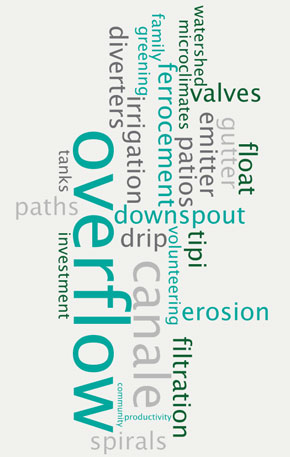The PermaDesign Weblog, with Nate Downey and Melissa McDonald!
Water Wisdom Brewing in New Mexico Senate
From my column "Permaculture in Practice" I talk about legislation regarding an important component to water harvesting.
Even though I design and install cistern systems, I talk many clients out of owning one. The average property owner often can’t afford the pipes, filters, tank(s), pumping system, and distribution lines required in active water-harvesting systems.
Fortunately there are plenty of other meaningful and less expensive forms of collecting and using stormwater runoff. Passive systems such as fish-scale swales, rain gardens, wicks, and sheet mulching are excellent investments, but they can never be as efficient and productive as cisterns.
Cisterns store runoff from impervious surfaces for long periods of time, and they allow water to be used where and when necessary. Whether connected to a hose or drip irrigation system, harvested runoff form cisterns is a resource that we’ve neglected for too long. Cisterns can also be valuable during emergencies. You never know when your well will run dry or when your community water system is going to be rationed — or worse. Just ask 300,000 West Virginians or the many people whose lives have been destroyed by fracking.
Cisterns are nothing new. Aristotle in his Politics encouraged the installation of water-storage tanks in cities. They would be useful during a siege. It can also be critical to have a cistern during a wildfire. Fire departments love them.
As drought persists and demand for jobs and growth does the same, communities are seeing how water harvesting can provide myriad benefits. Perhaps the least well known of these is that cisterns not only increase the quantity of usable water in a watershed, but they also improve local river-water quality by reducing the sediment that typically runs off of developed land.
This year, Governor Susana Martinez wants to spend $112 million on conventional water projects for some drought-stricken New Mexico communities. Although these expenditures certainly seems necessary, on a more creative and uplifting level, State Senator Peter Wirth has introduced SB16 and SB91. The former offers annual income-tax credits up to $5,000 for water-harvesting projects. The latter opens the door for water catchment financing districts that could issue bonds and lend money to property owners who want to install water-catchment systems. The landowner’s payments would be made with property’s annual tax assessment. Modeled after New Mexico’s clean energy program, which was set up to finance solar panel installations (also initiated by Wirth), SB91 would provide financing opportunities that are currently unavalable.
Our state’s similar solar program was initially derailed because Fanny Mae and Freddy Mac objected to solar-panel payments (as tax payments) getting in the way of people paying their mortgages. It seems we will have to organize first to turn these bills into laws. Then, in the case of SB91, we will also have to extract a couple of bloated agencies out of our essential work to diversify our water portfolio in the Land of Enchantment. This seems doable, but the movement will need your help. Please contact Senator Wirth or me for more information.
04/04/2014 | (0) Comments










Comments